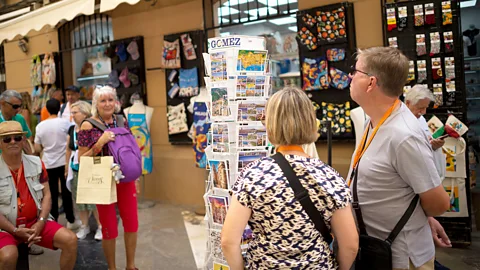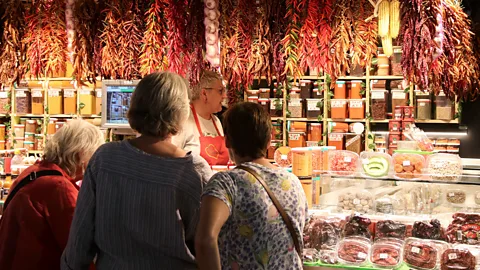Is it time to change how we buy travel souvenirs?
 Getty Images
Getty ImagesThe BBC looks into the psychology behind travel souvenirs: why we buy them, their impact on local communities and the planet, and how we can shop more thoughtfully.
On a recent backpacking trip through the Himalayas, my bruises became the truest souvenirs. Three months later, many of the contusions remain – stubborn scars with no intention of fading. More personal than anything I could have bought, they carry a backstory only I can tell, and I know exactly where they came from, with no hidden costs to the planet or people. Perhaps that's why, over time, my desire for typical souvenirs has faded. I now value experiences over objects – looking for meaning in what I bring back rather than just another trinket.
But maybe that's just me. Two out of three Americans bring back a souvenir from their travels, with US sales topping $21bn (£16.7bn) in 2022. The souvenir industry has drawn criticism for its reliance on mass production and cultural appropriation. Still, it remains to be an often-overlooked side of tourism's impact. Frequent flyers face scrutiny, but trinket collectors rarely do. Innovative ways to preserve memories remain largely unrealised. And when a friend hands me a fridge magnet stamped with their latest destination, I cringe. What does it really mean to take home a piece of a place, and at what cost?
Humans have always had a penchant for collecting things. The Romans brought home spices, animal skins and rare artefacts to commemorate their travels and conquests. In the 18th Century, iconic locations like the Rome's Colosseum and Stonehenge in England were plundered by souvenir-seekers.
With the rise of industralisation and capitalism, a lot changed: the world became more connected, tourism boomed and profits took centre stage. But the human need to stayed. "Looking at a souvenir can bring back happy emotions as the brain links it to positive experiences," said Vaishnavi Madarkal, a psychologist and therapist based in India. "This connection can happen with anything – [whether it's] an object, music or a smell."
 Tarang Mohnot
Tarang MohnotThe word "souvenir" comes from French, meaning "memory" or "remembrance". But the allure of souvenirs goes beyond memories. According to Madarkal, often it's the dopamine rush of retail therapy or cultural gift-giving norms. Take Japan's omiyage tradition, where travellers bring back small edible gifts for friends, family and co-workers. I, too, have picked up presents like saffron and pimentón in Spain or seaweed chips in Thailand, wanting to share my travels with loved ones.
For many, souvenirs go beyond tangible reminders and material gifts – they satisfy a deeper need to say, "I was there!" "At the core of our actions is a desire to feel heard, seen and validated," explains Madarkal. "The same holds for why we may buy souvenirs."
THOUGHTFUL TRAVEL
Want to travel better? Thoughtful Travel is a series on the ways people behave while away, from ethics to etiquette and more.
But how does this fit into a world already overwhelmed by excess? "The era of innocent tourism – where it was seen as a benign and universally positive force – ended around 2015," says Justin Francis, co-founder of Responsible Travel, a UK-based travel agency specialising in ethical tourism. "In Europe and America, protests against overtourism are growing. People are realising their vacations can leave lasting impacts on others' homes."
Yet, while travellers today are more aware of their impact, souvenirs have been somewhat left behind. With 25 years in the travel industry, Francis offers a macro perspective. "Though we haven't fully shifted yet, things have changed," he said. "I've often witnessed travellers examine products, and ask, 'Where did this come from">window._taboola = window._taboola || []; _taboola.push({ mode: 'alternating-thumbnails-a', container: 'taboola-below-article', placement: 'Below Article', target_type: 'mix' });
